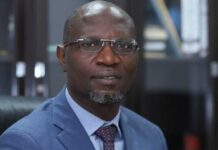Mrs. Bamidele Abiodun, First Lady, Ogun State and captains of industry have stressed the need to leverage technology to bridge the digital gender divide for economic inclusiveness and national development.
They spoke at the Institute of Directors (IoD) Annual Women’s Director’s Luncheon with the theme: “Virtually Unstoppable: Defining the New Inclusive Economy” on Tuesday in Lagos.
Abiodun, noting that the coronavirus pandemic brought to light huge gaps in global operations, stated that it was imperative for government and global organizations to pay attention to those that had been left behind digitally.
“The theme is quite apt as it ensures that the economic gaps that the rapid changes that a technologically driven world brings are minimized.
“IoD has played a huge role in economic empowerment in Nigeria, especially for women as we have seen the advancement of women on boards across various sectors and industries.
“Inclusive economy is about the people that make up majority of our workforce, which are the small scale business owners mainly the market woman or the tailor finding it hard to survive.
“As inflation rises and the cost of living skyrockets, more people are thrown into poverty by the headwinds of the economy with women and people with disability unfortunately suffering the hardest economic disadvantages.
“In Ogun, our key aim with the Ajose foundation is to intervene where we could by giving out micro grants and extending credits to small businesses through corporate partners.
“All these are merely drops where support is required for inclusion and it is time to take the discussion on inclusion from our offices to the people with people’s wellbeing at the center of our agenda,” she said.
Mrs. Debola Osibogun, Chairperson, Women Directors Development Committee, IoD, said the event was aimed at effectively supporting women, particularly female directors and leaders in public and private sector to broaden their horizons.
She described gender inclusive growth as a cornerstone of sustainable development and charged women to take advantage of the opportunities technology provided to improve their endeavors.
Osibogun pushed for more active participation in the Information and Communication Technology (ICT) space by women with deliberate strategies and intervention that would broaden and sharpen their skills to reduce the invisible digital gender divide.
She added that women must also position themselves through capacity building to be better placed to influence government policies to address digital gender and other disparities.
“Women have been exposed to less favorable situations which have been due to societal misconception about women, especially in Africa.
“Women carry the bulk of these societal responsibilities and to redefine the role of women in Nigeria, there is the need to drive women emancipation via technology as an avenue to liberate women and address gender inequality.
“Technology has emerged as the new tool in the new normal post COVID-19, and women must not be left behind.
“There is, therefore, the strong need to proffer strategies and action plans to manage the times ahead through effective leadership and technology,” she said.
Dr Ije Jidenma, IoD President, described technology and advances made in science as the saving grace of the world from COVID-19.
She called on government and stakeholders to prioritize digital initiatives that could give the country a good head start towards economic growth and development.
“Technology is a major driver of inclusiveness as it eliminates barriers and provides several opportunities for businesses to scale up.
“Ongoing digital revolution is transforming economies and Nigeria needs to be empowered with the necessary digital competencies within a regulated environment that protects the interests of users and stakeholders,” she said.
Dr Omobola Johnson, Chairman, Guinness Nigeria, stated that technology was a major means to achieve inclusiveness through rural technology infrastructure development.
She stressed the need to connect Nigeria and Nigerians with access to technology to engender inclusiveness.
Johnson added that technology would also help track down perpetrators of crime via identify infrastructure, security infrastructure among others and stressed the need to use technology as a means of securing the country.
“Government needs to create the enabling environment and then stay aside to allow businesses to thrive and drive regulations that limit what technology companies do with your data.
“Women, however, need to get more conversant with technology to really drive inclusiveness,” she said.
Karl Toriola, CEO, MTN Nigeria Plc, stated the need to invest in the Nigerian technology space from bottom up to engender inclusiveness on a non-prejudice basis as technology was fast becoming a utility.
He noted that the world was unequaled and stratified where females were disproportionately excluded with root causes driven by complex social, economic and cultural barriers.
“Technology is fast becoming a utility and part of our drive to engender inclusiveness is a rural broadband coverage.
“Part of our strategy is to also within a few years have a 50 per cent participation of women in all levels of the organization,” he said.
Mrs. Kofo Akinkugbe, Founder, SecurID, said as women directors, technology must be in the midst and at the fore of any decision making process to drive any organization.
“Technology advancement would continue to have significant impact of businesses and it is our collective responsibility to move along with the change,” she said.





















